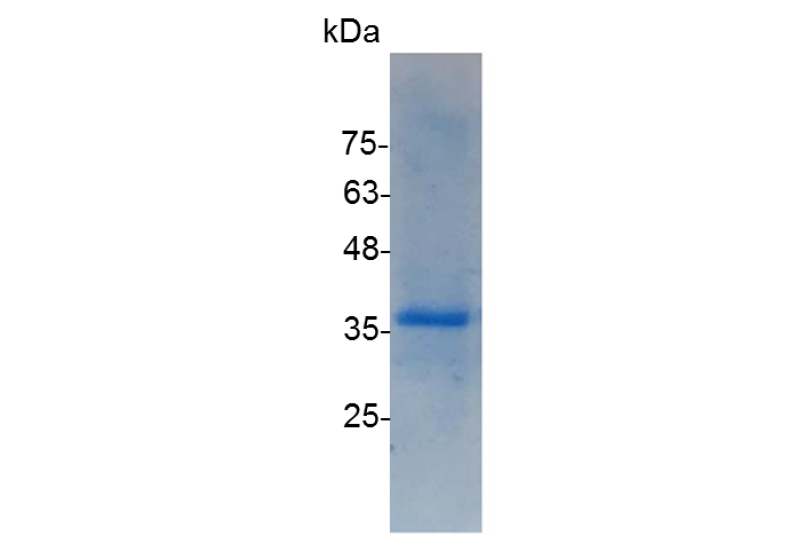Galectin-9, Human
Galectin-9 is belonging to the lectin family, that containing total 15 mammalian lectin members. Similar to other galectins, There is a carbohydrate recognition binding domain that enables Galectin-9 binding to β-galactosides specifically. Most galectins are either bivalent or multivalent regarding their carbohydrate binding capacity, which enables the recognition of distinct signaling pathways. Galectin-9 may be retained intracellularly or transported to the cell surface where it can be cleaved to generate a soluble form. Galectin-9 functions in effector and regulatory phases of the immune response. During inflammation, the production of Galectin-9 in vivo generates a microenvironment that limits effector T cell responses. Galectin-9 can negatively regulate the Th1 immune response by engaging TIM-3 on T cells, which leads to induction of intracellular Ca2+ influx and activation of apoptosis pathways.
Sequence:
AFSGSQAPYLSPAVPFSGTIQGGLQDGLQITVNGTVLSSSGTRFAVNFQTGFSGNDIAFHFNPRFEDGGYVVCNTRQNGSWGPEERKTHMP
FQKGMPFDLCFLVQSSDFKVMVNGILFVQYFHRVPFHRVDTISVNGSVQLSYISFQPPGVWPANPAPITQTVIHTVQSAPGQMFSTPAIPP
MMYPHPAYPMPFITTILGGLYPSKSILLSGTVLPSAQRFHINLCSGNHIAFHLNPRFDENAVVRNTQIDNSWGSEERSLPRKMPFVRGQSF
SVWILCEAHCLKVAVDGQHLFEYYHRLRNLPTINRLEVGGDIQLTHVQT with polyhistidine tag at the N-terminus
UnitProt ID:
O00182
Source:
Escherichia coli
Endotoxin Test:
<0.1 EU per 1 μg of the protein by the LAL method.
Activity:
Measured by its ability of the immobilized protein to support the adhesion of Jurkat cells. The ED50 for this effect is <3 μg/mL.
Purity:
>98% as determined by SDS-PAGE analysis.
Form:
Lyophilized
Storage Buffer:
Lyophilized from a 0.2 μm filtered solution of PBS, pH 7.4.
Reconstitution:
It is recommended to reconstitute the lyophilized protein in sterile H2O to a concentration not less than 200 μg/mL and incubate the stock solution for at least 20 min to ensure sufficient re-dissolved.
Stability & Storage:
This product is stable after storage at:
• -20°C for 12 months in lyophilized state from date of receipt.
• -20°C or -80°C for 1 month under sterile conditions after reconstitution.
Avoid repeated freeze/thaw cycles.
Shipping Conditions:
Blue ice
AFSGSQAPYLSPAVPFSGTIQGGLQDGLQITVNGTVLSSSGTRFAVNFQTGFSGNDIAFHFNPRFEDGGYVVCNTRQNGSWGPEERKTHMP
FQKGMPFDLCFLVQSSDFKVMVNGILFVQYFHRVPFHRVDTISVNGSVQLSYISFQPPGVWPANPAPITQTVIHTVQSAPGQMFSTPAIPP
MMYPHPAYPMPFITTILGGLYPSKSILLSGTVLPSAQRFHINLCSGNHIAFHLNPRFDENAVVRNTQIDNSWGSEERSLPRKMPFVRGQSF
SVWILCEAHCLKVAVDGQHLFEYYHRLRNLPTINRLEVGGDIQLTHVQT with polyhistidine tag at the N-terminus
UnitProt ID:
O00182
Source:
Escherichia coli
Endotoxin Test:
<0.1 EU per 1 μg of the protein by the LAL method.
Activity:
Measured by its ability of the immobilized protein to support the adhesion of Jurkat cells. The ED50 for this effect is <3 μg/mL.
Purity:
>98% as determined by SDS-PAGE analysis.
Form:
Lyophilized
Storage Buffer:
Lyophilized from a 0.2 μm filtered solution of PBS, pH 7.4.
Reconstitution:
It is recommended to reconstitute the lyophilized protein in sterile H2O to a concentration not less than 200 μg/mL and incubate the stock solution for at least 20 min to ensure sufficient re-dissolved.
Stability & Storage:
This product is stable after storage at:
• -20°C for 12 months in lyophilized state from date of receipt.
• -20°C or -80°C for 1 month under sterile conditions after reconstitution.
Avoid repeated freeze/thaw cycles.
Shipping Conditions:
Blue ice


